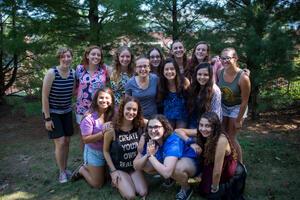Rising Voices and Rising Activists
JWA's Rising Voices Fellowship helps female-identified teens develop authentic voices, strengthen their leadership through writing, and begin to influence the important conversations of the Jewish community. Of course, these rockstars are already shaking things up in their communities today. This is Part Two of the Rising Voices in Action series, a month-long series that demonstrates the many different ways in which you can challenge the status quo, no matter your gender or age.
At some point in their development, almost all young feminists must figure out how to balance participation in inherently patriarchal institutions with their burgeoning feminist sensibilities. This balancing act can be particularly tricky for young women raised in organized religions, which are often even more explicit about their sexist practices than other institutions.
Luckily, like generations of Jewish feminists before them our Rising Voices Fellows are working to find a place for themselves as women and as feminists within the context of the Jewish faith, by wearing kippot despite funny looks from teachers, by petitioning to wear tallitot, and by disagreeing with adult authority figures in a public forum for the first time. These young women’s experiences and actions show that it’s difficult, but possible, to bring feminism to organized religion.
I was getting annoyed. I had been attending a small Jewish day school since first grade, and now, in seventh grade, the institution which boasted pluralism was still pushing conservative values. As an observant Reform Jew and a feminist, some of their policies and tendencies had begun to really get to me. One of my least favorite things was that girls were discouraged from wearing kippot. I saw my little sister, only in elementary school, being taught that she doesn’t have the same religious obligations and opportunities as boys. My friends and I complained to the administration, but they brushed us off. So it was time for a rebellion. All we did was start wearing kippot to morning prayers. We didn’t make a fuss. We didn’t say a word. We just went for it. The boys expressed their confusion, and the teachers gave us looks, but no one said anything. No one ever admitted that anything had changed, and we were never recognized by the administration; however, my little sister wears her kippah proudly now, and that’s about the best outcome we could have hoped for.
The image of a wall keeping someone from achieving a goal is one of the oldest clichés in the book about overcoming adversity. But to me, the mechitzah, a literal wall dividing me from all I wanted to do, was emblematic of my Jewish Feminist struggle. When I was in 7th grade, I began to resist such barriers. At my bat mitzvah, I started wearing a tallit. Many rabbis told me that I couldn't do this, and questioned my motives. Though my intentions were unclear, even to me, I persisted. I petitioned the administration for permission to wear my tallit. Throughout this process, my intentions came into focus. In order to gain permission in the first place, I had to prove that my intent was purely religious. In having to prove it, I understood that religion was, and had always been, the driving force for me. After all, practicing religion, regardless of gender, is a right, not a privilege. After earning this right for myself, I came to recognize the importance of fighting for similar rights for others.
On a Wednesday night I sat in my temple surrounded by the Congregational Board; a group of strong-willed adults with a shared passion for our small, yet lively, Jewish community. I was sitting in on the meeting as a representative of my youth group’s board, expected to listen and relay information back to the teens; a silent spectator. However, this meeting was different. It was Voting Night. Naturally, clashes in opinion arose, and when it came time to vote, the tension in the room was palpable. My dad, a faithful board member, was there, and when my hand shot up in favor while his stayed down in opposition, I was shocked at myself. This was the first time in my life that I publicly disagreed with my dad, and it got me thinking. So often, children are taught that they should share their parents’ views. To disagree is to disrespect those who raised us. I had lived by this rule since my kindergarten days, and am now beginning to notice its flaws. This experience made me realize that my unique worldview and my opinions matter, and that I have a right and a responsibility to use them to help shape my Jewish community.
Inspired by these reflections? You can check out RVF’s other blog posts. If you love the series and want to hear more about what these budding revolutionaries are doing, let us know and we can add you to our mailing list!
This piece was written as part of JWA’s Rising Voices Fellowship.










